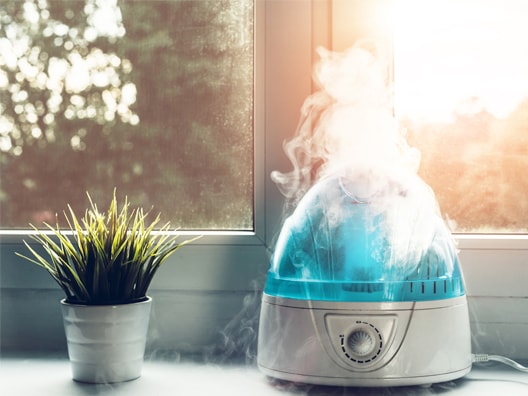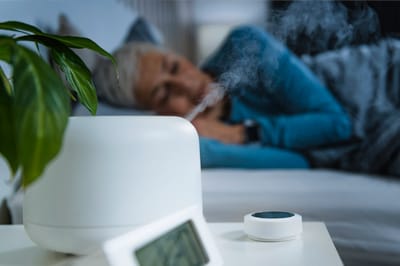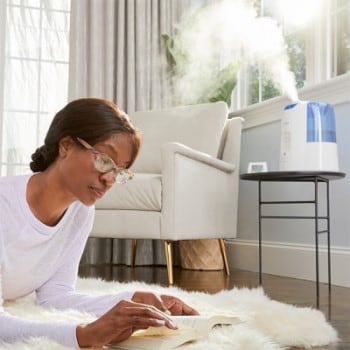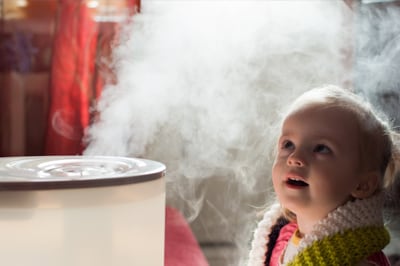Humidifier Buying Guide
Posted on October 09, 2022 By Alison P
When temperatures outside get cooler and you rely on your heater more often, the humidity level inside your home can quickly plummet. Often used during the wintertime to ease the discomforts caused by dry air, a humidifier can help prevent dry skin and chapped lips. A humidifier may also help temporarily alleviate respiratory problems and increase the year-round protection of your home interior. With so many options to choose from, deciding which humidifier is right for your needs can feel overwhelming. Use this helpful guide to learn about the different types of humidifiers available so you can select the right option for you.
What Is a Humidifier?
A humidifier is a device that increases the humidity level in a space by emitting cool or warm vapor or steam. During drier winter months when the heating system can quickly dry out the air, a humidifier offers a practical way to add essential moisture back into the environment. Seasonal dry air can cause a range of ailments, including itchy eyes, severely dry skin, headaches, respiratory issues, and increased allergies. If you experience any of these problems, consider investing in a humidifier to increase the amount of moisture in your air. A humidifier doesn't just offer relief during the wintertime - if you live in an area that experiences prolonged periods of arid weather, a humidifier can also help alleviate the effects of dry air year-round.
What Does a Humidifier Do?
A humidifier adds moisturizing mist to a room by spraying subtle amounts of water or vapor into the atmosphere. Although humidifier designs may vary, the water is most commonly stored inside a tank until a filter absorbs the excess moisture. A fan then disperses the moisture into the space.
Types of Humidifiers
It's important to note that different humidifier types and models vary in size, operation, and gallon output. That said, get to know more about the various popular humidifier options available so you can decide which is the best choice for your space.
Cool Mist Humidifiers
A cool mist humidifier provides additional hydration for your room and relieves the effects of dry air by circulating a stream of room-temperature mist throughout a space. The two common types of cool mist humidifiers are evaporative and ultrasonic. Evaporative humidifiers have internal wick filters that absorb moisture and fans that circulate air. They dispense water as an ultra-fine mist throughout the environment. Ultrasonic humidifiers use ultrasonic vibration technology to quietly release a micro-fine cool mist throughout the room.
A cool mist humidifier offers a practical way to add extra moisture to a large room or even an entire home. An additional benefit is that they typically use less electricity because the water isn't heated before it's dispersed.

Warm Mist Humidifiers
This type of humidifier uses a built-in heating element to boil water before dispersing it throughout the room as an invisible mist. Warm mist humidifiers, also known as steam vaporizers, might be a good fit for use during colder weather since they emit warm mists of moisture.
Some warm mist humidifier benefits include:
- Quiet Operation: Warm mist humidifiers don't have internal fans, which makes them super quiet to operate.
- Improved Air Quality: Since warm mist humidifiers are designed to boil water, potentially harmful substances like mold and bacteria may be eliminated before moisture is circulated through the air.
- Cough Relief: Some warm mist humidifiers can be used to soothe a cough.
What Makes Humidifiers Different from Other Devices?
Maintaining the right level of humidity and comfort inside your home or office is highly important. Learn the differences between humidifiers and the following devices that are often confused with humidifiers.
Humidifier vs. Dehumidifier
When the air is too dry, a humidifier adds moisture to a space. A dehumidifier performs the opposite function by removing excess moisture from the air. The two main reasons people use dehumidifiers are to lessen seasonal allergies and reduce the sticky, unpleasant feeling when humidity levels are too high.
Humidifier vs. Diffuser
Humidifiers and diffusers are often confused because they have similar functions and often look alike. A diffuser is designed to add fragrance to a space by dispensing water mixed with essential oils into the atmosphere for an aromatherapy effect. A humidifier uses water to increase the moisture in a specific area.
Humidifier vs. Air Purifier
Humidifiers and air purifiers serve different purposes. An air purifier helps to clear mold, odors, allergens, and dust from the room. Humidifiers, on the other hand, are solely designed to improve the humidity level of a space. They are not intended to control air quality; however, they may offer some improvement depending on the type of humidifier.
Humidifier Benefits
Humidifiers may help alleviate numerous dry air symptoms such as seasonal allergies, dry skin, sore throat, chapped lips, respiratory problems, and sinus infections. Humidifiers can also help with home maintenance by preventing furnishings from drying out and aging. The following is a breakdown of just a few humidifier benefits to consider:
- Home Interior Preservation: Dry air can cause home furnishings and elements like wallpaper and paint to peel. It can also cause furniture and wood flooring to warp. The moisture that a humidifier produces can reduce these issues.
- Static Electricity Reduction: A humidifier can reduce unexpected shocks and protect electrical equipment.
- Better Breathing Conditions: The mist a humidifier dispenses can help soothe nasal and respiratory passages, making it easier to breathe.

Choosing a Humidifier By Room Size
Different types of humidifiers are intended for rooms of varying sizes, ranging from personal humidifiers that can humidify an average of 25 square feet to console models that can humidify 1000 square feet or more. To figure out the humidifier size you'll need to effectively increase the comfort of your space, begin by measuring the square footage of your room. For small and medium-sized rooms like bedrooms, tabletop models work well. Humidifier consoles are better suited for humidifying larger spaces since they produce lots of moist air and have larger water storage tanks that require less refilling. After you've measured your square footage, choose a humidifier option that will suit your space. Most humidifier product packaging displays the max square footage the model can accommodate.
Where Should I Put My Humidifier?
Though this will mostly tie in with how large your room is, choosing where to place your humidifier is also up to preference. If its small enough, you can place it virtually anywhere you want, as long as it has space to do its thing. A larger unit, however, is going to require a little more effort. A full humidifier is going to require you to put it in a large enough space, possibly near a corner of a room, that also has enough space to allow the water vapor to make it into the air. You also should avoid putting it on the floor, so try to get it up higher. Definitely dont put it on the floor if itll be near any carpets or rugs. Placing your humidifier in the right spot can be the difference between it properly working and it damaging items in your room, so make sure to put special care into choosing where to put it.
Humidifier Features
Although the features vary by model, today's humidifiers come with a large array of controls and settings that make operation more convenient. Notable humidifier features to look for include:
- Auto Shutoff: This feature automatically shuts the unit off once the water reservoir is depleted, increasing safety and improving energy efficiency.
- Indicator Lights: Humidifiers with indicator lights alert you when the water supply is low, when you need to clean the humidifier, and when it's time to replace the filters.
- Variable Speeds: Being able to control multiple speeds can help you adjust the noise level of the unit and make it easier to control the humidifier's moisture output.
- Digital User Interface: This interface lets you understand your room's humidity levels so you can make changes when necessary.
- Hard Water Cartridge: A demineralization cartridge can reduce mineral deposits in the water you use to eliminate buildup caused by hard water.
- Allergen-Reducing Prefilter: A preliminary filter designed to clean the air can help decrease pollen, pet dander, allergens, and dust in your home.
- Ultraviolet Light: A humidifier with ultraviolet light technology can kill bacteria, mold, and germs before they're dispersed as a mist.
Humidifier FAQs
Can You Put Essential Oils In a Humidifier?
Essential oils can play a supportive role in reducing stress and promoting relaxation. While you can add essential oils to your humidifier, there are a few things to keep in mind. First, to preserve the maximum effectiveness of the essential oil, a cool mist humidifier works best. A warm mist humidifier that uses heat to dispense mist could destroy some of the properties of the oil. Second, since most humidifiers continuously run, you won't be able to control how much oil is dispensed into the air. You should determine the right amount of oil to use based on the size of the water reservoir. Finally, consider cleaning your humidifier more frequently if you use the unit to dispense essential oils.
Are Humidifiers Safe For Plants?
When plants wilt and their color begins to dull in the winter, the culprit is often dry air. A humidifier can help preserve plant moisture and reduce its evapotranspiration rate. When choosing the right humidifier to suit your indoor plants, consider the species of your plants. Desert plants such as succulents and cacti can thrive in areas with low humidity. Other plants generally require a much higher humidity level to survive. The location of your humidifier matters, too. Since a humidifier uses a fan to rotate and release moisture, placing a unit too close to your plants could cause wilting.
How Often Do I Need to Refill My Humidifier?
If you run your portable humidifier continually during the day and night, you'll most likely need to refill it every 24 hours. Some humidifier models provide continuous humidification for more than 24 hours before they need a refill. If you use your humidifier less often, you won't have to refill it as frequently. When it's time to refill your humidifier, use distilled or demineralized water. The minerals often found in tap water can create deposits inside the unit that encourage bacterial growth. When these deposits are dispersed through the air, they usually have the appearance of white dust.

How Do You Find the Right Humidifier For Babies?
Many parents wonder whether every type of humidifier is safe for babies. The answer is that cool mist humidifiers are considered much safer for babies and children. Warm mist models could be dangerous due to their heating components. Always be sure to keep any humidifier and its cords out of a child's reach.
What Should the Humidity Level Be In a Home?
The ideal humidity level for your home or office ranges between 30 and 50 percent. Humidity levels higher than 50 percent can cause stuffiness and condensation, which can even lead to mold, fungi, and bacterial growth. Many humidifier models have built-in humidistats that monitor the humidity level of a room. These types of humidifiers allow you to adjust humidity levels to your preference. If your humidifier doesn't include a humidistat, you can purchase an inexpensive hygrometer or humidistat to easily measure the humidity level of your space.
Is It Good to Sleep with a Humidifier On?
Some of the alleged positive effects from sleeping with a humidifier range from helping with snoring to preventing you from getting respiratory infections. However, there are some potential cons to this practice. The largest is that it could be a potential fire hazard, especially if youre running a warm mist humidifier all night. Another issue is that youll have to clean it much more often to make sure your unit doesnt get dirty. There are pros and cons to sleeping with your humidifier running, but if you do choose to do so, try to be safe about it.
Find your humidifier today, and breathe a little easier this winter!